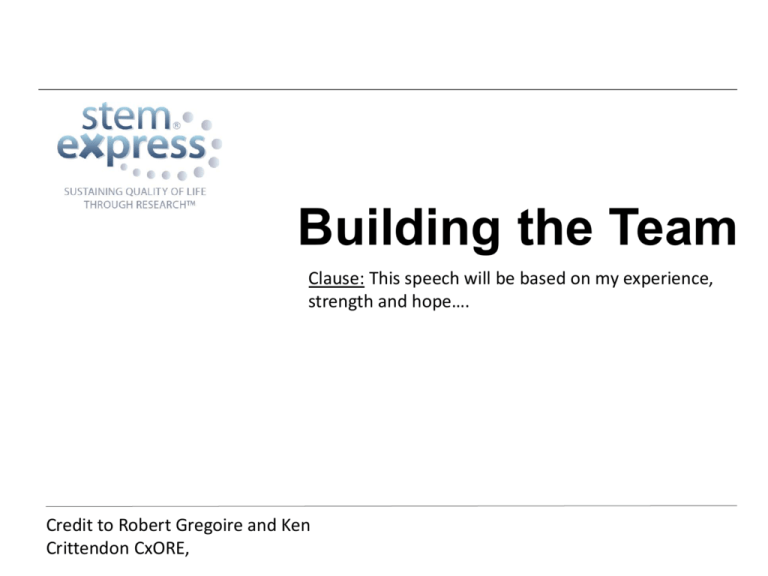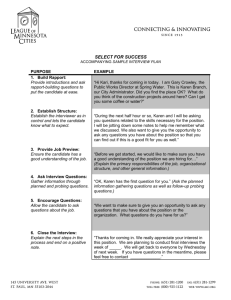Building the Team - UC Davis Graduate School of Management
advertisement

Building the Team Clause: This speech will be based on my experience, strength and hope…. Credit to Robert Gregoire and Ken Crittendon CxORE, Building the team What do you need? – A management team – Advisory Board(s) – Board of Directors – Executors Build an “INFORMAL” Advisory Board These people will be critical in helping you understand what to do, who can do it, and where to find them. Advisors entail less commitment, and their value changes as you learn more about your business hence the need for “informal”, it will change as you grow so don’t get married yet. Don’t promise money or equity to advisors until they have PROVED their valuable and going to be around long term. Be weary if they want it up front. The roles of the Advisory Board Four forms of capital: – Financial capital (money) – physical capital (lab space, equipment) – intellectual capital (know-how) – social capital (know-who) Your advisors should be contributing at least 1 (and ideally 2) forms of capital. Finding the right people Sketch out what you need but be open… – What are your priorities for year 1? – What experiences and skills do you need to accomplish those priorities? – What are your weaknesses and who has your strengths? Write a Job Description What is the opportunity? – Why is your company exciting and worth the risk? What are the responsibilities? – What will the person do every day? What characteristics are you seeking? – What skills and personality traits will lead to success? What is the compensation? – Show that you are at least thinking about them… If they can’t see the vision…DON’T convince them. ...then write a Performance Review What are the responsibilities? – What will the person do every day? What do you need accomplished? – Be explicit. How will you measure those accomplishments? – Be specific. What resources do they have (or need) to achieve? You’re not a charity…ask yourself on every employee “what value are they creating”? On hiring people What happens if you get it right? What happens if you get it wrong? "Only the Best" Always raise the bar – Hire people who are smarter and more capable than you, and make sure all your employees do the same – As a company grows, early employees should find themselves thinking By Jack Welch: – "A players hire other A players. B players hire C players, and C players put you out of business." What is your mission – How is your mission in everything you do. "Fire the Rest" When an employee is not right for your company, be decisive – If you let the situation fester, the bad employee will create growing problems in your company – Founders typically say that letting problem employees stay too long is their #1 regret Here's how to stay out of trouble: – Structure all jobs "at will" (no employment contracts!) – Don’t get into stock or vesting until you have a successful business (again my opinion). – Document non-performance and provide feedback – Vigilant.org….best money I spend each month. Seek Goal Alignment Hire – Strike a balance between "young and talented" and "experienced and expensive" Emphasize mission of company – If an employee doesn't believe in the future value of the business, they are not right for a startup – Be very careful with prospective employees who have never worked in a small company environment Employee review process is key – The company needs to meet the employee half way, providing tasks that help the employee meet goals Equity 101 Do you need co-founders? – Why, for what purpose? – What will they specifically contribute that you can’t? When to consider stock options: – Don’t offer stock to early – Careful with family especially if you want to keep them – What are YOU getting for that STOCK? Always consult your board, mentors, and true friends first. Some comments on interviewing. 1. Trust your gut if you have learned how to listen to it. 2. Write out the questions in advance (and base them on your job description) 3. Screen them first via a phone call. If you are starting a company or growing a business you don’t have time to waste on poor interviews. How to Interview Don't limit yourself to one interview style – Get other employees and/or advisors involved, especially if you have a tendency to believe what people tell you. – Divide and conquer: don’t all ask the same questions and burn out the candidate Main questions I frame questions around: – Are they adults? Regardless of age. – Do they have proven skill in the area being hired in? – Don’t make long term statements, they need to prove themselves. Don't be afraid to be tough and analytical How to Interview The "due diligence" interview – Tests whether the candidate is honest and actually has the experience claimed by his or her resume – The resume itself is the #1 tool in this style of interview – Ask questions that test direct knowledge of claims and probe for additional detail when relevant: "So, it says here that you managed a marketing budget of $10M while you were at Interactive Corp—how did you spend the budget? What types of spend produced the best results for your project?" How to Interview The "horsepower" interview – Tests raw intelligence, skills, creativity, and confidence – Outside the box questions that might scare a weak prospect are the best tool in this style of interview, where you are trying to learn not just what she thinks, but also how she thinks – Ask brain-teasers, creativity questions and case studies: "So, why do you think that Microsoft beat Netscape in the browser wars?" How to Interview The "culture fit" interview – Tests whether a candidate can handle the rigors of a startup and fit with the culture you are creating – Use multiple interviewers and a mix of professional and social settings to get a real picture of what the candidate is really like (take your time…) – Have peers and subordinates conduct interviews too, because the candidate will always be kissing your ass if you are the founder—find out who has two faces! How to Interview The "exercise" interview – Tests whether a candidate can actually do the job – Give the candidate a real exercise that tests (a) whether he is willing to put some actual work in to get the job and (b) whether the domain competence is really there – Get some work done for free: Writing: "Write an SOP in the next 15 minutes on how to boil water” Personal References Always do reference checks, even if a recruiter is doing checks, too The people should get glowing reviews – Because bad employees will sue for defamation, bad references rarely come to light If the people are good, can you learn anything from a reference? – “How will they behave when things go bad?” Always ask open-ended questions – "Is there anything else I should know?"





